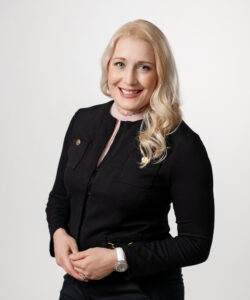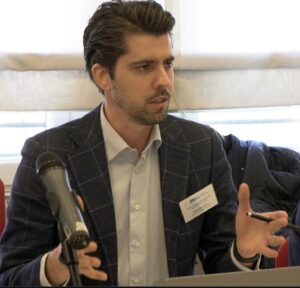Following the tradition, the Faculty of Social Sciences, Arts and Humanities of Kaunas University of Technology organises an international interdisciplinary conference that delves into conceptual and practical developments of governance mechanisms at the European level to achieve the targets of the UN Sustainable Development Goals.
Therefore, the conference aims to bring together members of academic and civil society, public policymakers and implementers to present the newest research results and discuss practical implications regarding European processes concerned with new conceptions and adaptation of governance mechanisms towards Sustainable Development Goals. The contributions may take the form of case studies, theoretical models, or provisions of practical recommendations for policymakers, researchers, and practitioners interested in public governance mechanisms towards sustainable development. Political, economic, managerial and social aspects of governance mechanisms will be the focus of the conference.
Contributions are welcome in the following thematic fields:
The conference will take place on the 10th of May, 2024 at KTU Faculty of Social Sciences, Arts and Humanities, A. Mickevičiaus str. 37, Kaunas, Lithuania.
Language of the conference: English

Dr. Monika von Bonsdorff
Monika von Bonsdorff, Dr. (Econ.) is an Associate Professor in Management and Leadership at the Jyväskylä University School of Business and Economics. Her research interests include human resource management, well-being at work, successful aging, and development across the life course. She has published in journals such as the Journal of Management, Journal of Managerial Psychology, International Journal of Human Resource, Canadian Medical Journal, and Journal of American Epidemiology.
___________________________________
 Karolis Granickas
Karolis Granickas
Karolis is Open Contracting Partnership’s Head of Europe working with the European institutions, country governments, and civil society to improve public spending in the region. Driven by impact and that alone, he focuses on strengthening institutions and their public spending using openness principles. He is interested in how open contracting can help power sustainable transition in Europe. Karolis is a member of the European Commission Multi-Stakeholder Expert Group on eProcurement (EXEP), and Civil Society Committee at the European Bank for Reconstruction and Development. He is the founder of the Open Spending EU Coalition – a community of open spending champions in the EU.
Before joining the Open Contracting Partnership, Karolis worked with Transparency International Lithuania, focusing on citizen engagement using ICT. He also contributed to global open data advocacy efforts, together with the Epsi platform, Open Knowledge International, Open Data Institute and others. From 2014 to 2016, he was a national researcher within the Open Government Partnership Independent Review Mechanism.
Karolis earned his bachelor’s degree in international law from the University of Westminster, UK and Master’s degree in European Union law from the University of Maastricht, the Netherlands.
DEADLINES:
| Registration and abstract submission | Registration extended until 20th of March, 2024 |
| Confirmation of the abstract acceptance | 27th of March, 2024 |
| Participant registration | 29th of March, 2024 |
| Registration fee payment | until 2nd of April, 2024 |
| Preliminary conference program | 15th of April, 2024 |
BASIC REQUIREMENTS FOR THE EXTENDED ABSTRACT AND FINAL PAPER SUBMISSION:
| Requirements for the Abstract Submission |
|
|
The structure of the abstract:
The abstract has to present: (1) the purpose of the study Keywords (at least 5). At the end: author’s affiliation: name, surname, scientific degree, institution, and research fields. The page margins – 2 cm overall, Times New Roman, 10 pt for the text, single space between lines. |
| Price | 250 EUR/per participant (197 EUR+21% VAT) * |
| Price for PhD students | 150 EUR/per participant (118 EUR+21% VAT) * |
| Price for KTU representatives | 100 EUR/per participant (83 EUR+21% VAT) * |
| Beneficiary‘s Bank: | |
| Name | AB SEB bankas |
| Address | Gedimino pr. 12, LT-01103 Vilnius, Lithuania |
| Swift code | CBVILT2X |
| Account no. | LT387044060003104481 |
| Name | Kaunas University of Technology |
| Address | K. Donelaičio g. 73, LT-44029 Kaunas, Lithuania |
| Please specify in „Purpose of Payment“ | EU Conference Fee Surname, Ko018 |
Conference registration fee according to the mentioned above per one participant. If there are more authors of presentation but only one of them is going to attend the conference, the conference fee will be regular for one participant. In this case, one package will be presented to the authors.
The bank transfer receipt should be transferred by email: donata.jovarauskiene@ktu.lt
Please, inform us if you need an official invoice in advance: donata.jovarauskiene@ktu.lt
You will get a confirmation letter about the participation as well as the registration fee transfer.
Every presenter will have approx. 10 min. for presentation and 5 min. for comments and discussion. If you exceed the allocated time, the chair will stop you and open the discussion.
Presentations with empirical findings should include a brief overview of prior research positioning your research in a respective field, the key concepts, research question(s) and/or hypotheses, methodology, empirical findings, conclusions and statements or questions for discussion, which may include conceptual and theoretical implications.
Presentations of conceptual papers should address the research question(s), give an overview of the concept(s) under development and argue the novelty of your proposed framework or concept, followed by conclusions and discussion.
Practice-focused presentations should present the problem that the practice(s) addresses(s), its novel character (if applicable), the process of its implementation and outcomes, concluding with the lessons learnt.
Authors will be able to submit qualified papers to the scientific journal Public Policy and Administration
General
A. Mickevičiaus g. 37, Kaunas, Lithuania
E-mail: rasa.daugeliene@ktu.lt
Scientific Programme
Rasa Daugėlienė
E-mail: rasa.daugeliene@ktu.lt
Practical information
Donata Jovarauskienė
Registration fees, payments
E-mail: donata.jovarauskiene@ktu.lt
THE UNIVERSITY
Kaunas University of Technology is a leading Lithuanian University providing a wide range of studies and closely cooperating with businesses. The University provides studies of engineering, technologies, physical and social sciences, humanities and arts. The research groups working at KTU contribute to the global scientific knowledge by conducting cutting-edge interdisciplinary research on the most important questions of current time.
KAUNAS CITY
Kaunas is the second-largest city in Lithuania and has historically been a leading centre of Lithuanian economic, academic and cultural life. The centre of Kaunas is divided into the Old and the New Town. The Old Town is a remarkable archaeological monument and an architectural masterpiece incorporating Gothic, Renaissance and Baroque styles. It is a concentration of the ancient architectural monuments, such as the remnants of the 13th century castle, the impressive Town Hall, popularly known as the White Swan, and the Vilnius street, a characteristic trade street of the Middle Ages. The New Town is represented by Laisvės alėja or tLiberty Avenue – a central pedestrian street often called the ‘Heart of Kaunas’ where numerous hotels, shops, restaurants, cafes and bars are located. Kaunas is famous for M. K. Čiurlionis Art Gallery where you can find the unique collection of works painted by the famous Lithuanian painter and composer M. K. Čiurlionis. The conference venue is located in the centre of Kaunas and within walking distance to various interesting places. Due to its geographical position, today, Kaunas is Lithuania’s most important centre of communication. It is a home of a variety of festivals & events, from operettas to modern dance, from classical music to Jazz. Kaunas was chosen as the European Capital of Culture 2022. The city is famous for its Interwar architecture, which was awarded the European Heritage label and is on its way to UNESCO.
Between 1920 and 1940, Kaunas was the temporary capital of Lithuania. The fast-growing city became a cradle of the Lithuanian intelligentsia and culture. On December 2015, Kaunas became the first city in Eastern and Central Europe to win the status of UNESCO City of Design.
| Chair: |
| Dr. Rasa Daugėlienė, Kaunas University of Technology, Lithuania |
| Committee members: |
| Dr. Donata Jovarauskienė, Kaunas University of Technology, Lithuania |
| Audronė Pauliukevičiūtė, Kaunas University of Technology, Lithuania |
| Indrė Baltrušaitienė, Kaunas University of Technology, Lithuania |
| Prof. dr. Raminta Pučėtaitė, Kaunas University of Technology, Lithuania |
| Chair: |
| Dr. Rasa Daugėlienė, Kaunas University of Technology, Lithuania |
| Committee Members: |
| Prof. Dr. Janis Priede, University of Latvia, Latvia |
| Dr. Raminta Pučėtaitė, Kaunas University of Technology, Lithuania |
| Prof. dr. Phil. Velga Vevere, The University College of Economics and Culture, Latvia |
| Dr. Prof. Jelena Titko, EKA University of Applied Sciences, Latvia |
| Dr. Joanna Stryjek, SGH Warsaw School of Economics, Poland |
| Dr. Donata Jovarauskienė, Kaunas University of Technology, Lithuania |
| Prof. habil. dr. Malgorzata Zajaczkowski, Warsaw School of Economics, Poland |
| Dr. Natalie Aleksandra Gurvitš-Suits, Tallin University of Technology, Estonia |
| Prof. dr. Biruta Sloka, University of Latvia, Latvia |
| Prof. dr. Stanislaw Uminski, University of Gdansk, Research Centre on European Integration, Poland |
| Prof. dr. hab. Joanna Bednarz, University of Gdansk, Poland |
| Prof. Habil. Dr. Joanna Kuczewska, University of Gdansk, Poland |
| Dr. Rosita Zvirgzdina, Turiba University, Latvia |
| Prof. dr. Gazmend M Qorraj, University of Prishtina, Kosovo, Albania |
| Dr. oec. Iveta Liniņa, Turiba University, Latvia |
| Prof. dr. Jari Stenvall, University of Tampere, Finland |
| Dr. Mariana Orliv, Ivano-Frankivsk National Technical University of Oil and Gas, Ukraine |
| Dr. Natalja Tocelovska, University of Latvia, Latvia |
| Prof. dr. Jari Roy Lee Kaivo-oja, Finland Futures Research Centre, Turku School of Economics, University of Turku, Finland |
| Dr. Loredana Maria Simionov, University Alexandru Ioan Cuza in Iaşi, Romania |